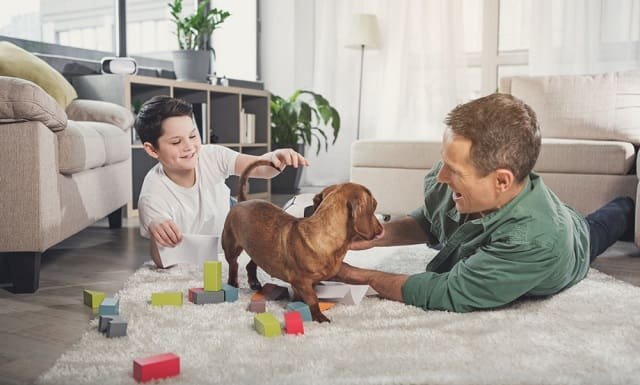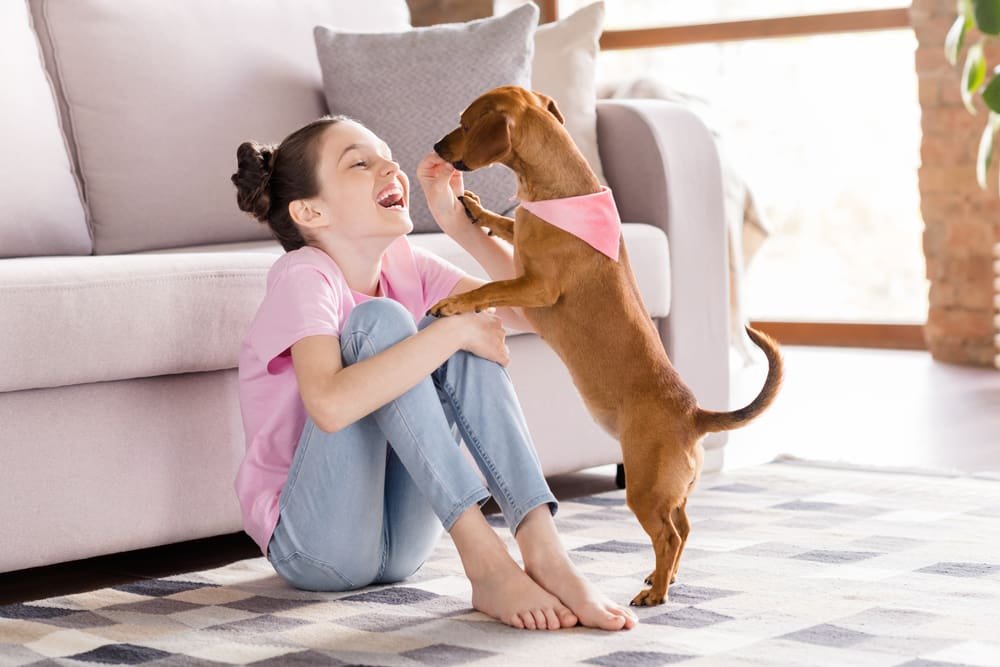Table of Contents
Are Dachshunds good with kids? It’s a question that many parents ponder before bringing a furry friend into the family. Known for their unique body shape and charming personality, Dachshunds are an intriguing choice for families with children.
Dachshunds, often lovingly referred to as wiener dogs, are generally good-natured and affectionate, making them suitable companions for kids. However, it’s essential to consider a few factors when evaluating their compatibility with little ones. Their small size and delicate back make them prone to injury, so it’s crucial to supervise interactions between young children and Dachshunds to prevent accidental harm.
Understanding The Temperament: Are Dachshunds Good With Kids
Dachshunds are known for their spunky and lively temperament. They are often described as brave, clever, and sometimes even stubborn. While these traits can make them entertaining and engaging companions for children, they can also pose challenges.
It’s important to note that Dachshunds are a hunting breed, which means they may have a strong prey drive. This instinct could lead them to chase after small children, especially if they are running or playing in a way that triggers the Dachshund’s hunting instincts. It’s crucial to teach children how to interact appropriately with the dog and avoid situations that may provoke the Dachshund’s prey drive.
Despite their small size, Dachshunds can be bold and protective. They may become defensive if they feel threatened or perceive their family, including children, to be in danger. While this can be a positive trait, it’s essential to educate children about appropriate behavior around the dog to avoid triggering any defensive responses.

Benefits Of Dachshunds For Families With Kids
Dachshunds can bring numerous benefits to families with children. Their small size makes them suitable for living in apartments or smaller homes, where space may be limited. Additionally, their low exercise needs mean they can adapt well to a family’s lifestyle, whether it’s a busy household with active children or a more relaxed environment.
Dachshunds are known to be loyal and loving companions. They often form strong bonds with their families, including children. This bond can provide children with a sense of security and comfort, knowing they have a constant and devoted friend by their side. Dachshunds are also known for their playful nature, making them excellent playmates for kids. They enjoy interactive games and activities, which can help children develop their social skills and provide hours of entertainment.
Essential Considerations When Introducing a Dachshund To Kids
When considering a Dachshund as a family pet, it’s essential to take several factors into account. Firstly, it’s crucial to assess the age and behavior of the children. Young children may not have developed the understanding or self-control necessary to interact appropriately with a small dog like a Dachshund. It’s essential to supervise all interactions between young children and the dog to prevent any accidental harm.
It’s also important to consider the individual temperament and personality of the Dachshund. Some Dachshunds may be naturally more patient and tolerant of children, while others may be less inclined to tolerate rough handling or excessive noise. Early socialization and proper training are crucial to ensure that a Dachshund grows into a well-behaved and patient companion for children.
Training Tips For Dachshunds and Kids
Training is an essential aspect of ensuring a harmonious relationship between Dachshunds and children. Here are some tips to help facilitate a positive and respectful dynamic between them:
- Teach children how to approach and handle the Dachshund gently. They should avoid pulling on the dog’s ears or tail and refrain from rough play that may cause the dog discomfort or injury.
- Teach children to respect the Dachshund’s personal space. They should understand that the dog may need alone time or a quiet area to retreat when feeling overwhelmed.
- Involve children in the training process. Teach them basic commands, such as sit or stay, and encourage them to participate in positive reinforcement training with treats or praise.
- Educate children about the importance of consistency in training. They should understand that everyone in the family needs to follow the same rules and boundaries to ensure Dachshund’s understanding and compliance.
- Supervise all interactions between children and the Dachshund, especially during the initial stages. This will allow you to intervene if inappropriate behavior or rough play occurs.

Common Myths About Dachshunds and Kids
There are several myths and misconceptions surrounding Dachshunds’ interaction with children. Let’s debunk some of the most common ones:
- Myth: Dachshunds are aggressive towards children. Reality: While any dog breed can potentially display aggression, Dachshunds are not inherently aggressive towards children. Proper training and socialization can help mitigate any potential issues.
- Myth: Dachshunds are not suitable for families with young children. Reality: With proper supervision and training, Dachshunds can be excellent companions for families with children of all ages.
- Myth: Dachshunds are fragile and easily injured by children. Reality: While Dachshunds have delicate backs that require care, they can coexist safely with children if proper handling and supervision are maintained.
- Myth: Dachshunds are too miniature to be around children. Reality: Dachshunds may be miniature, but their size does not necessarily make them unsuitable for families with children. Their adaptability and affectionate nature make them great companions for kids.
Precautions To Take When Having Dachshunds and Kids Together
To ensure a safe and harmonious environment for both Dachshunds and children, it’s essential to take certain precautions:
- Teach children how to approach and handle the Dachshund gently, avoiding any rough play or excessive force.
- Establish clear boundaries for both the Dachshund and the children. Teach children to respect the dog’s personal space and provide the Dachshund with a designated area to retreat when needed.
- Always supervise interactions between children and the Dachshund, especially during the initial stages of their relationship. This will allow you to intervene if inappropriate behavior or rough play occurs.
- Provide the Dachshund with a safe space, such as a crate or designated room, to retreat if it feels overwhelmed or needs some alone time.
- Educate children about the signs of stress or discomfort in dogs, such as growling, snapping, or attempting to hide. Teach them to recognize these signs and to give the dog space when it displays them.
Personal Experiences Of Families With Dachshunds and Kids
Many families have successfully integrated Dachshunds into their households, creating lifelong bonds between the dogs and their children. One such family is the Johnsons, with a 5-year-old Dachshund named Daisy. They found that Daisy quickly became a beloved companion for their two children, Emily and Jack.
Emily and Jack learned how to interact with Daisy gently from a young age. They were taught to approach her calmly and to avoid sudden movements that might startle her. The kids loved playing with Daisy, and she reciprocated their affection with endless cuddles and tail wags.
The Johnsons emphasized the importance of supervision and training. They made sure that Emily and Jack understood the boundaries and rules when it came to interacting with Daisy. With consistent training and positive reinforcement, Daisy became a patient and well-behaved family member.
Alternatives To Dachshunds For Families With Kids
While Dachshunds can make wonderful family pets, they might not be the best fit for every family. Here are some alternative dog breeds to consider:
- Golden Retriever: Known for their friendly and gentle nature, Golden Retrievers are excellent companions for families with children. They are patient and tolerant, making them great playmates for kids of all ages.
- Labrador Retriever: Labradors are known for their playful and outgoing personalities. They are highly adaptable and get along well with children, making them a popular choice for families.
- Beagle: Beagles are friendly and pleasant dogs that often do well with children. They are energetic and enjoy playtime, making them an excellent choice for families with active kids.
- Bulldog: Bulldogs are known for their calm and patient demeanor. They are generally good with children and adapt well to family life.
When choosing a dog breed for your family, it’s essential to consider factors such as size, temperament, and energy level to ensure a compatible match.
Conclusion
Dachshunds can make fantastic companions for families with children. Their affectionate nature, adaptability, and playful personalities can bring joy and love to any household. However, it’s crucial to introduce children and Dachshunds slowly and supervise their interactions to ensure the safety and well-being of both parties.
Like any breed, Dachshunds have their unique characteristics and requirements, and not all individuals will be a perfect fit for every family. However, with love, patience, and proper training, a Dachshund can become a cherished playmate for kids, offering endless cuddles and unconditional love. So, if you’re considering adding a Dachshund to your family, take the necessary precautions, provide proper training, and enjoy the incredible journey of raising a Dachshund alongside your children.
